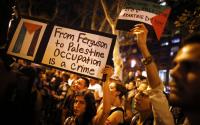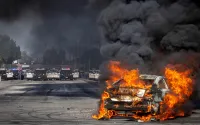29 December 2006Xan Rice
Ethiopian tanks rolled into the outskirts of the Somali capital, Mogadishu, yesterday after Somalia's Islamist movement abandoned its bases in the city.
Somali government forces and their Ethiopian allies were wresting back control over Mogadishu as Islamist fighters, surrounded and outgunned, fled in convoy early in the morning towards the southern port city of Kismayo, the only town now controlled by the Somali Council of Islamic Courts. Other militiamen discarded their uniforms and joined clan-based militias in the capital. A number of Islamist leaders left the country.
Gunfire echoed around the capital as news of the withdrawal spread. SCIC bases were looted and several people were killed in a return to the anarchy that plagued the city before the courts came to power six months ago. Within hours, warlords who had been driven out by the Islamists were reclaiming their turf, including the presidential palace and the city's main port.
Somali prime minister Ali Mohamad Gedi said parliament would impose three months of martial law to prevent a return to anarchy. "In order to restore security we need a strong hand, especially with freelance militias," he told reporters.
The Islamists' dramatic retreat took many by surprise. Nine days ago they had surrounded the government base of Baidoa and controlled most of south-central Somalia. Despite their retreat after aerial assaults from Ethiopia, which is supporting Somalia's weak transitional government, the Islamists had been expected to defend the capital fiercely.
Sheikh Sharif Sheikh Ahmed, head of the SCIC's executive committee, told Al-Jazeera television the decision to leave Mogadishu was made to prevent civilian bloodshed. "We have withdrawn all the leaders and members who worked in the capital. Mogadishu is now in chaos."
Mr Ahmed, who was believed to have arrived in the Kenyan capital, Nairobi, later in the day, said the Islamists were still united and would eventually repel the Ethiopian forces. But with the pro-government alliance entering parts of Mogadishu in the early evening, it appeared the courts had been dealt a severe, perhaps fatal, blow.
The Ethiopian prime minister, Meles Zenawi, indicated that the military offensive, which has already claimed hundreds of lives, was not over. "The [SCIC] leaders, Eritreans and international jihadists are fleeing ... but we'll continue to pursue them - that's our agenda."
Ethiopia has been wary of the Islamists since they come to power in June, defeating a coalition of warlords. The SCIC immediately established law and order in the capital and their leaders said they wanted to make the country an Islamic state. But one European diplomat said yesterday: "The extreme elements have not disappeared into thin air. They may still try to turn the country into another Afghanistan." The government's alliances with warlords that were ousted by the Islamists also left analysts uneasy. "If this just means that the warlords are on their way back, then it's all pretty depressing," said another western diplomat.
The UN said last night it was readying a resumption of its aid operation in Somalia, where more than half a million people have been receiving emergency supplies. But many have chosen to flee. Yesterday, there were fears for 160 refugees after the UN agency said at least 17 people died and 140 were missing after two boats packed with Somalis sank off the coast of Yemen.
Yemeni security forces had opened fire on smugglers ferrying more than 500 people. Many of the survivors said they had been fleeing the conflict, and the UN fears the upsurge in fighting could create a new wave of refugees.
What might happen next?
1. The Transitional Federal Government (TFG), which is weak and largely unpopular, comes to a power-sharing agreement with the powerful Hawiye clan in Mogadishu and installs a functioning administration in the capital. Ethiopian forces withdraw. By negotiating with clans in Somalia's other important cities, the TFG begins to exert some form of central authority, putting the country on the path to normality.
2. Ethiopia withdraws its troops and the TFG is unable to exert any real authority beyond its base of Baidoa. In the vacuum created by the Islamists' departure, power reverts to clan-based warlords who have held sway in Somalia for the past 16 years. The anarchic situation that existed before the Somali Council of Islamic Courts (SCIC) rose to power in Mogadishu returns.
3. The remnants of the SCIC, in particular the militant Shabaab wing, regroup to wage guerrilla war against the government - and the Ethiopians, if they stay. Eritrea and other Arab states continue to sponsor the Islamists. Somalia becomes a magnet for foreign militants keen to help local fighters establish an Islamic state.






